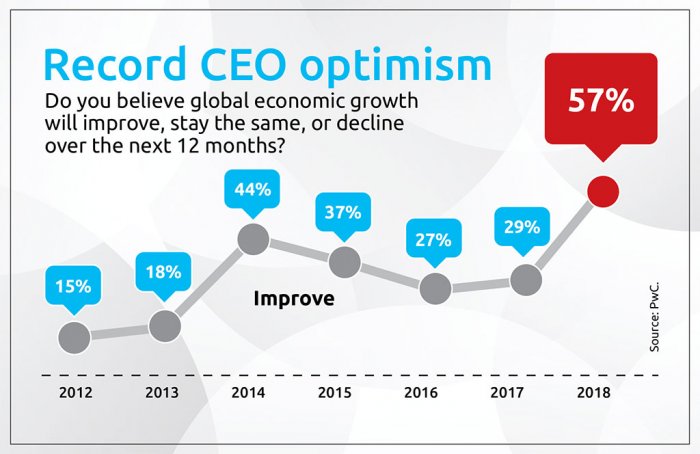CEO optimism booms despite rising anxiety over threats to growth

BBJ Infographic
A record-breaking number of CEOs are optimistic about the economic environment worldwide, at least in the short term. This is one of the key findings of PwCʼs 21st survey of almost 1,300 CEOs around the world, launched at the World Economic Forum Annual Meeting in Davos, Switzerland.
The Hungarian CEO survey, detailing the local picture, will be published on March 8.
Fifty-seven percent of global business leaders say they believe global economic growth will improve in the next 12 months. This is almost twice the level of last year (29%), and the largest increase since PwC began asking about global growth in 2012.
"Iʼm very confident about Hungarian economic growth," said Nick Kós, PwC Hungaryʼs Country Managing Partner. "As regards global growth, I believe the key influencing factors will be the United States and China. Global CEOs are rightfully optimistic, as we look forward to a more peaceful year: the Chinese economy is performing well, and tensions have calmed in the eurozone."
"There will be general elections in Hungary in a few monthsʼ time, so now it is very exciting to find out what Hungarian CEOs think about the Hungarian economy and their own growth prospects," noted Kós. "After the results of PwCʼs Global CEO Survey are revealed at the World Economic Forum in Davos, we will release the Hungarian survey findings in March," he added.
This optimism in the economy is feeding into CEOsʼ confidence about their own companiesʼ outlook. Some 42% percent of CEOs said they are "very confident" in their own organizationʼs growth prospects over the next 12 months, up from 38% last year.
The top three most confident sectors for their own 12-month prospects this year are Technology (48%), Business Services (46%), and Pharmaceutical & Life Sciences (46%).
CEO confidence in the U.S. market extends overseas, with non-U.S. based CEOs once again voting it the top market for growth in the next 12 months. This year, the United States reinforced its lead on China (46% vs. 33%, respectively, with the Statesʼ lead over China up 2 percentage points compared with 2017). Germany (20%) remains in third place, followed by the United Kingdom (15%) in fourth.
Impact of technology
While recent research by PwC showed that workers are optimistic about technology improving their job prospects, CEOs admit that helping employees retrain, and increasing transparency on how automation and AI could impact jobs, is becoming a more important issue for them.
Two-thirds of CEOs believe they have a responsibility to retrain employees whose roles are replaced by technology, chiefly among the Engineering & Construction (73%), Technology (71%), and Communications (77%) sectors.
The digital and automation transition is particularly acute in the Financial Services sector. Almost a quarter (24%) of Banking & Capital Markets and Insurance CEOs plan workforce reductions, with 28% of Banking & Capital Markets jobs likely to be lost to a large extent due to technology and automation.
Threats to growth
In parallel with overall optimism, anxiety is nevertheless rising over a much broader range of business, social and economic threats. CEOs are said to be "extremely concerned" about geopolitical uncertainty (40%), cyber threats (40%), terrorism (41%), availability of key skills (38%), and populism (35%).
Underlining the shift, extreme concern about terrorism has doubled (41% in 2018 vs. 20% in 2017), as terrorism entered the top ten threats to growth. The threat of over-regulation remains the top concern for CEOs (42% extremely concerned), while more than a third (36%) remain concerned about an increasing tax burden.
"The higher level of concern is being driven by larger societal and geopolitical shifts rather than the dynamics of business leadersʼ own markets," commented Bob Moritz, Global Chairman of PwC. "Itʼs clear their mid to long-term confidence in revenue growth is tempered by threats the business world is not used to tackling directly itself."
SUPPORT THE BUDAPEST BUSINESS JOURNAL
Producing journalism that is worthy of the name is a costly business. For 27 years, the publishers, editors and reporters of the Budapest Business Journal have striven to bring you business news that works, information that you can trust, that is factual, accurate and presented without fear or favor.
Newspaper organizations across the globe have struggled to find a business model that allows them to continue to excel, without compromising their ability to perform. Most recently, some have experimented with the idea of involving their most important stakeholders, their readers.
We would like to offer that same opportunity to our readers. We would like to invite you to help us deliver the quality business journalism you require. Hit our Support the BBJ button and you can choose the how much and how often you send us your contributions.







